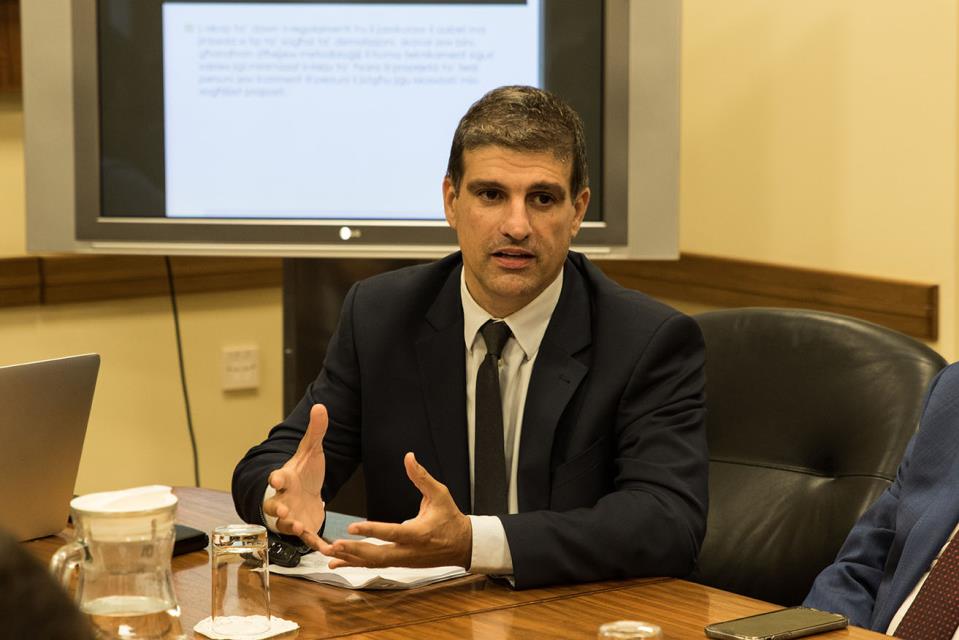The new Avoidance to Third Party Property Regulations, which have been "radically changed" since the first draft issued on 17th June, will be published in Tuesday's Government Gazette and hence come into force tomorrow, with all construction projects including those which have already begun having to adhere to them.
In a press conference on Monday, Minister for Transport, Infrastructure, and Capital Projects Ian Borg explained at length what the changes that the new law contains are, before also noting that this is only part of the reforms that will be implemented in the construction industry.
The new law will implement radical changes when it comes to the method statement, with "vague and unstructured" method statements not being accepted anymore. Government consultant and architect Robert Musumeci explained that the method statement will incorporate geological surveys if the architect deems them necessary, and also seek to identify the load bearing characteristics of the buildings in the area.
In fact, the method statement for excavation - there is also one for demolition and another for construction - contains 13 points which architects drawing up the method statement must address.
A condition report requirement has also been included in the new law, with stipulations on what must be included within this report being included as well, Musumeci explained.
Previously, the law simply stated that a method statement had to be followed, but it did not fully stipulate what should have actually been written in the said method statement.
Minister Borg noted that out of the 250 or so responses that the government had received from the consultation period, which lasted just five days, the word 'responsibility' was a central theme. In fact, he said that through these new regulations the government is shouldering its share of responsibility, and called on other sectors to do the same.

"[The new regulations] will not make everyone happy, but we need to see that everyone upholds their responsibility. Whoever doesn't want any responsibility, knows what they have to do. Everyone has to shoulder their responsibility; the government, the contractor, the developer, the architect, the mason, the neighbour and others in this context", Borg said.
He noted that another significant change within the new law was to add transparency where there previously was none, explaining that each method statement must now be made available for public scrutiny through the Planning Authority's e-Applications portal, and citizens will have a two-week timeframe to comment on the statement and even object to it if they feel the need to do so.
Speaking on what should happen while works are ongoing; Borg said that the government is of the opinion that a site technical officer (a term which replaces that of 'site manager') should always be on site and noted that this person must have an architect's warrant, although he left the door open to the possibility that the list of professionals who are eligible to be a site technical officer could increase from just architects in the future.
He noted that the said site technical officer must be employed by the contractor and can be different from the architect who is employed to design the project and draw up the method statement.
"We will not permit contractors to employ people who are not warranted by the state for supervision, however hard it may sound and however divergent it may sound from the idea of the chamber of these professionals itself", Borg said.
He noted that this was only one part of the reforms in the construction industry and said that he was content with how the government had acted, saying that their reaction was "necessary and proportionate" before noting that even if it is going to add a certain amount of work, if it was that missing work which was causing incidents, then the reform is satisfactory.
The reforms have to be followed by all straight away, meaning that there is no transitory period. In essence, it means that for all demolition, excavation and construction works - even if they have already started - there now has to be a competent and warranted site technical officer appointed, and the condition reports and method statements must be submitted and uploaded onto the PA's website as stipulated by the law.
The fines for those who do not observe the declaration of a method statement were increased from a maximum of €500 to a maximum of €10,000 The fines for those who do not obey enforcement orders is being increased from a maximum of €1,200 to a maximum of €50,000
New construction agency in coming weeks which will then turn into authority; BRO and PA to team up on enforcement
A new construction agency, which has been in the pipeline for the past year and which will gather every entity and authority related to construction, will come into being in the coming weeks, Borg said.
This new agency will then turn into an authority capable of enforcing the industry, Borg noted.
Asked by this newsroom what interim measures in terms of enforcement will be taken till this authority is set up, Borg said that the Building Regulation Office and the Planning Authority will be working together, and the PA will assist when it comes to enforcement matters.
Meanwhile, Parliamentary Secretary for Planning and the Property Market Chris Agius also said that a register of qualified and competent contractors is also in the pipeline and is being worked on.
Last Friday, a register of masons was published, although the Dean of the Faculty for the Built Environment Alex Torpiano noted that this register was not useful as it did not include details that can be used to identify the mason in question such as the person's identity card number.
Photos by Eva Krins